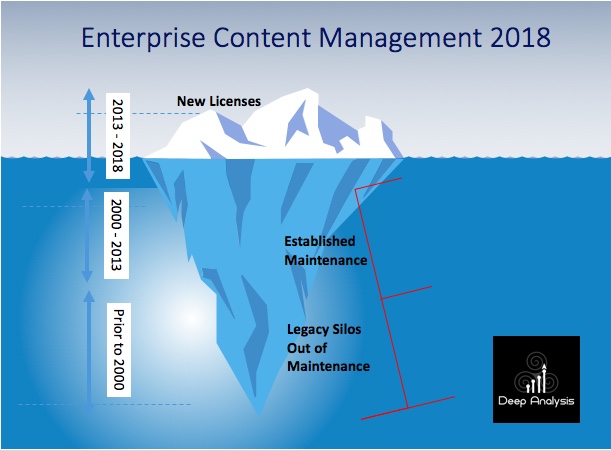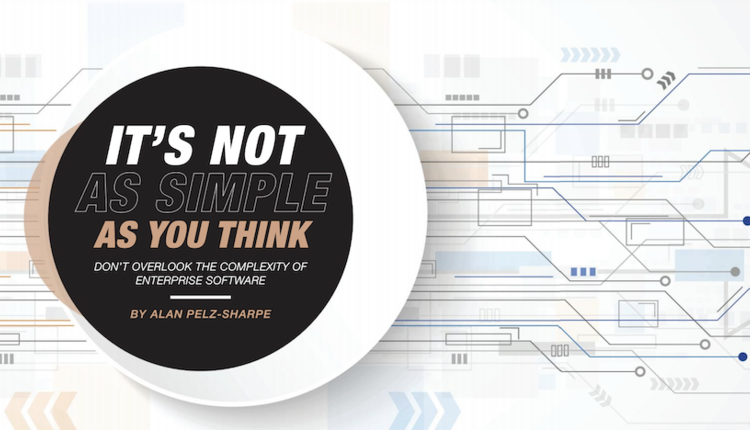
Image by: JLGutierrez, ©2018 Getty Images
Just over a year ago, Gartner published a highly provocative blog post claiming that "ECM is now dead (kaput, finite, an ex-market name)." They proposed that we all use the new term "content services" instead. Though many fiercely disagreed, it nonetheless sparked a timely discussion on the state of the enterprise content management (ECM) market—one that is far from dead.
In fact, the ECM market in 2017 stood at $6.3 billion and continues to grow at a CAGR of 8.7% a year. It will continue to grow at a healthy clip and will for many years to come, but the bigger question raised here is, "What is an ECM system in 2018?"
The Market Perspective
For an ECM technology vendor, it is tough to sell new product licenses. They have been in decline for years. In other words, there is trouble at the top, but here's the twist: the top (new license buyers) represents the tip of the proverbial iceberg.
Some of those systems are little more than expensive buckets full of dead files, but many more are pivotal to the business activities that are at the core of an organization. Like it or not, the world loves, and businesses run on, documents, and that isn't changing anytime soon. To put it into consulting jargon, there are few greenfield sites but a huge amount of brownfield sites. Some of those old systems are nearing end of life and need to be replaced, but many will continue to run as they are now.
The Technology Perspective
Looking at ECM technology itself, much is changing. Every ECM vendor wants its customers to rip and replace their old ECM systems with their newer products. Some customers do, but most don't. Why? Well, simply put, they have no interest in doing so, as the risk, complexity, and cost of ripping and replacing their old systems means it's not a feasible option. That isn't to say that they don't want those old systems to run better than they do today, do more things, and at a lower cost, however.First-generation systems did one thing well: They had brilliantly designed repositories for files, which were called file management systems. What they didn't do so well was provide usable applications or integrate well with other business processes. Enter content services.
Whether business-critical files live on premises in an old ECM system or whether they live in a modern cloud file storage system, their value is in their use. Modern APIs introduce the ability to plug in newer user interfaces and to associate complex business applications to those repositories. They also allow us to leverage artificial intelligence and machine learning to analyze files and intelligently automate more document processes than ever before. In fact, many are doing exactly that—leveraging content services to make better use of their older ECM systems. Some are going much farther than that: They want to move their files to the cloud and make use of the near-unlimited processing and storage capabilities that it offers.
Like it or not, the world loves, and businesses run on, documents, and that isn't changing anytime soon.
Whether business-critical files live on premises in an old ECM system or whether they live in a modern cloud file storage system, their value is in their use. Modern APIs introduce the ability to plug in newer user interfaces and to associate complex business applications to those repositories. They also allow us to leverage artificial intelligence and machine learning to analyze files and intelligently automate more document processes than ever before. In fact, many are doing exactly that—leveraging content services to make better use of their older ECM systems. Some are going much farther than that: They want to move their files to the cloud and make use of the near-unlimited processing and storage capabilities that it offers.
What's in a Name?
Content volumes will continue to grow unabated. Privacy, trust, security, and regulatory requirements continue to vex, and the chaos of multiple information silos remains a real and ever-present problem. Add to this the fact that an ECM buyer of an accounts payable system has little in common with an insurance firm trying to transform its claims processing system or an oil company trying to manage complex engineering data sheets and drawings, well, you get the picture.The challenge today surely is not whether we call the technology enterprise information management (EIM), ECM, content services, or cloud content management (all good and smart marketing terms), but it's in relating the use of those technologies to meet complex and urgent business needs. The time is ripe to reframe the ECM discussion away from repositories and toward the business use of documents and the critical information they contain.
Alan Pelz-Sharpe is the Founder and Principal Analyst of Deep Analysis, an independent technology research firm focused on next-generation information management. He has over 25 years of experience in the information technology (IT) industry working with a wide variety of end user organizations and vendors. Follow him on Twitter @alan_pelzsharpe.






![GettyImages-1211616422-[Converted]](https://cms-static.wehaacdn.com/documentmedia-com/images/GettyImages-1211616422--Converted-.2413.widea.0.jpg)
